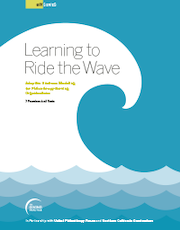Site Search
- resource provided by the Forum Network Knowledgebase.
Search Tip: Search with " " to find exact matches.
Foundations Facilitate Diversity, Equity, and Inclusion: Partnering with Community and Nonprofits, a new report by the OMG Center for Collaborative Learning, confirms that foundations can, in fact, facilitate diversity, equity, and inclusion (DEI) through their grantmaking processes and their partnerships with nonprofits—and identifies eight specific practices for foundations to emulate.
The report takes a deep dive into the work of nine foundations that represent a diverse cross-section of types and sizes, and offers useful lessons about how foundations can better partner with nonprofits to be more effective in their work.
What comes after “strategic...?” If you said, “planning,” you’re not alone. And for many leaders of community foundations, especially small ones who don’t have the time or money for a big process, anxiety is the feeling that follows. If that’s the case, this guide is for you.
It invites you to test-drive some activities to bring your current program, operations and community leadership strategies into focus before you decide whether to create a plan or not. It helps you discover ongoing strategic practices and decide whether to keep them or not. If you already have done a strategic plan, and it is languishing on a shelf, this guide will help you refresh it.
PART A: Good Strategy Takes Practice (Not Just Planning)
PART B: Do Your Discovery
PART C: Jumpstart Your Strategy Narrative
PART D: Bring It Together
Looking To What’s Next
A working glossary of terms to help shape a common language for work in Community Capacity. This glossary is intended to help promote philanthropy's roles in building community capacity by defining core concepts and closely related terms.

Developed in partnership with United Philanthropy Forum and Northern California Grantmakers, this guide shares seven practices and 12 tools for Philanthropy-Serving Organizations who seek effective ways to mobilize resources to sustain their organization’s work. The guide features perspectives from dozens of leaders of national and regional PSOs and examples from our work with these organizations. Much of the content is based on conversations and strategy work with PSO leaders, staff and board members.
This case study of the Council of Michigan Foundations' Peer Action Learning Network (PALN) is one of six examined in a report from New York University's Wagner Research Center for Leadership in Action, commissioned by Grantmakers for Effective Organizations. The PALN case study, along with the other five, explores the power of learning communities to build connections and knowledge to increase organizations’ community impact. It explains ways grantmakers can strategically support these efforts as well as key elements for designing learning communities, executing for success and extending the learning.
Despite a field replete with research, analysis, recommended policies and practices — not to mention an abundance of educational programs and frameworks for grantmaking to diverse communities — philanthropic leaders have been slow to advance these values in their foundations. Philanthropy Northwest (PNW) wondered: what is getting in the way? Why are good intentions, buttressed with theory and practical advice, not achieving better results on measures of diversity, equity and inclusion?
With the support of the D5 Coalition, PNW began a year-long study to explore these questions. The study was divided into two parts. They began with personal interviews of 23 philanthropic leaders in the Pacific Northwest. In order to better understand how these organizations incorporated diversity, equity, and inclusion into their work and workplaces, they collected baseline information about their staff composition, leadership styles, and organizational practices/policies.
This report details their findings. It includes an in-depth look at the peer cohort model, in which ten foundation leaders met regularly to discuss these issues and support each other in advancing their own leadership. It also includes practical lessons about shifting organizational cultures towards greater diversity, equity and inclusion — lessons drawn directly from the experiences of peer cohort leaders.
PNW presented this work in a webinar hosted by the D5 Coalition. The webinar recording and slides are below.
